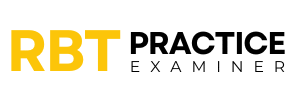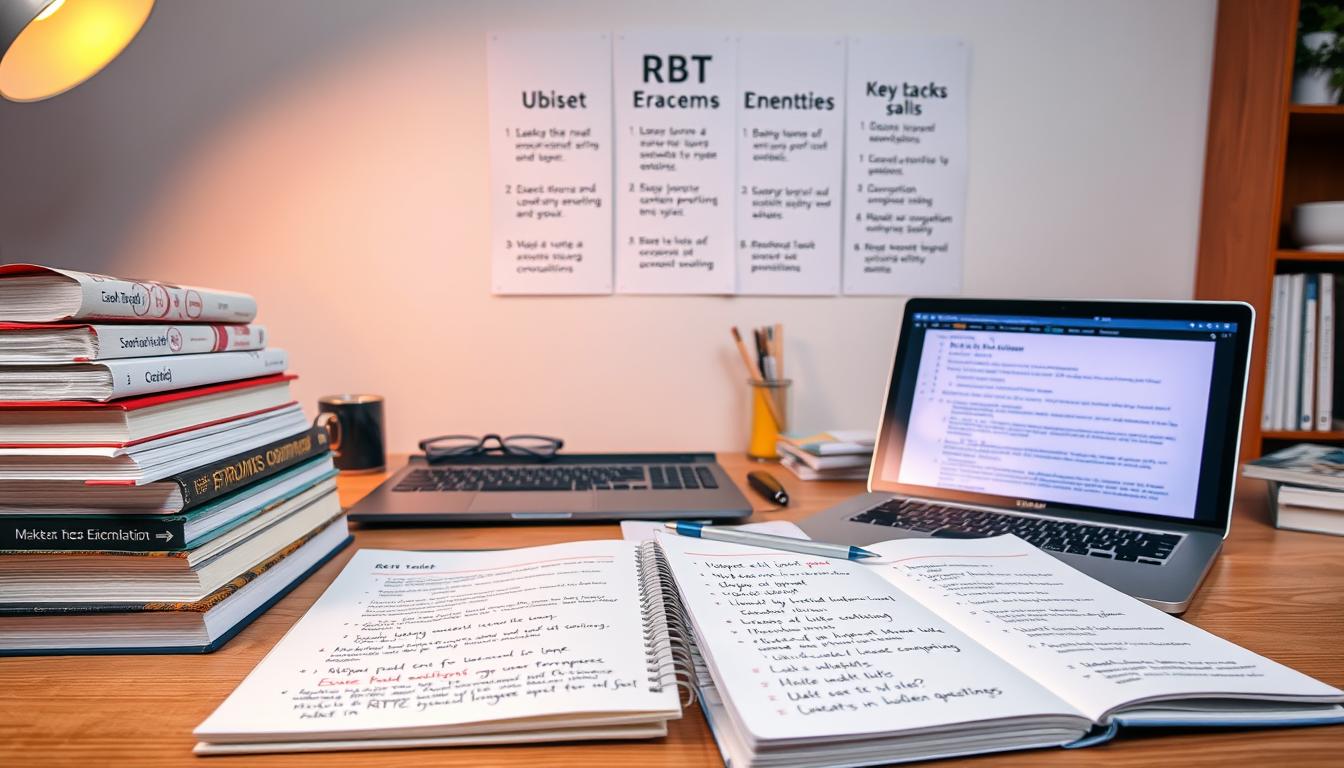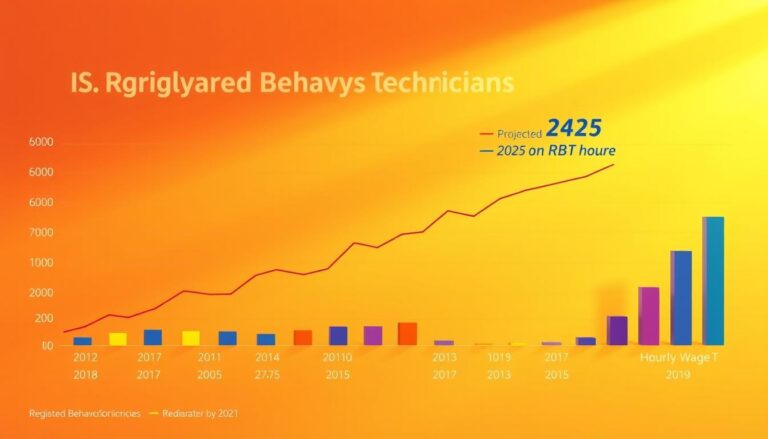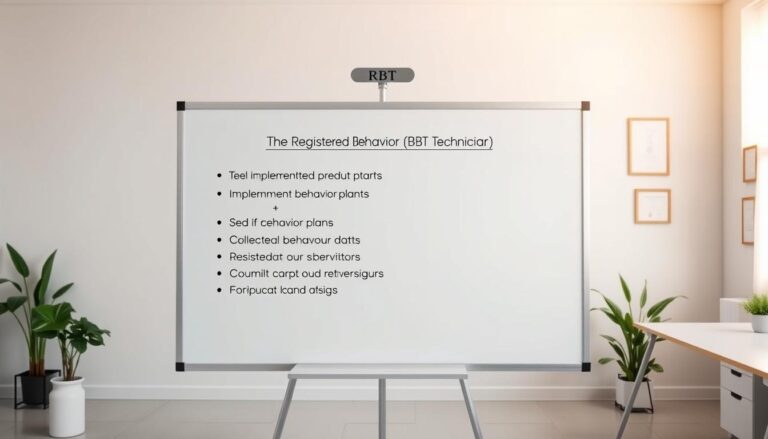Mastering the RBT Exam: Insights on Common Challenges Tricks
Getting ready for the Registered Behavior Technician (RBT) exam can be tough. Our guide will help you tackle common RBT exam challenges. We’ll share strategies to help you overcome obstacles.
The RBT certification is a big step for those working with autism and behavioral issues. Knowing the challenges of the RBT exam is key to preparing well.
Aspiring RBTs face many hurdles in their exam prep. These include complex terms and scenario-based questions. These test your understanding of behavioral interventions.
This article will guide you through the RBT exam with confidence. We’ll cover important study techniques and key knowledge areas. You’ll get practical tips to boost your exam readiness.
We aim to make your exam prep less daunting. By understanding the exam, mastering key concepts, and using effective study strategies, you’ll be ready to succeed in your RBT certification.
Understanding the RBT Exam Structure and Format
To get ready for RBT certification, it’s important to know the exam’s layout and style. The Registered Behavior Technician (RBT) exam is a big step for those starting in applied behavior analysis. Understanding what’s coming can help you study better and feel more confident on test day.
Core Components of the RBT Test
The RBT exam tests several key areas. These show if a technician can work well in behavioral settings. The main parts include:
- Measuring behavior
- Assessing and documenting
- Teaching new skills and reducing bad behavior
- Keeping records and reporting
- Acting professionally and ethically
Time Management Requirements
Managing your time well is key for RBT certification prep. The exam lasts 90 minutes and has 75 multiple-choice questions. You need to plan your time to answer each question carefully.
| Exam Component | Details |
|---|---|
| Total Exam Duration | 90 minutes |
| Number of Questions | 75 multiple-choice |
| Passing Score | 80% or higher |
Question Types and Distribution
Knowing the types of questions is vital for RBT exam prep. The test has different question styles to check your skills and knowledge:
- Scenario-based questions for practical skills
- Questions on theoretical concepts
- Scenarios for making ethical choices
- Questions on how to handle behavior
By getting to know these parts of the exam, you’ll feel more ready for the RBT certification process.
Essential Prerequisites for RBT Certification
Starting your journey to become a Registered Behavior Technician (RBT) requires careful steps. You need to understand and meet specific prerequisites. These steps ensure you’re ready to take the exam.
To schedule your RBT exam, you must meet certain requirements. These show you’re ready for the role. Here are the key qualifications:
- Minimum age requirement of 18 years
- High school diploma or equivalent
- Successful completion of a background check
- 40 hours of RBT training
Getting ready for the RBT exam means focusing on your training. The 40-hour program covers important topics like:
- Behavior reduction strategies
- Documentation techniques
- Professional ethics
- Applied Behavior Analysis (ABA) basics
You also need to pass a competency test given by a Board Certified Behavior Analyst (BCBA). This test checks your practical skills. It makes sure you’re ready for real-world situations.
Meeting these prerequisites takes dedication and focus. Each step builds a solid base for your career in behavioral therapy. It prepares you for success in the RBT certification process.
Common Knowledge Gaps in RBT Preparation
To master the RBT exam, you need to understand key areas where many struggle. Overcoming RBT exam obstacles begins with spotting and fixing major knowledge gaps. These gaps can affect how well you do on the exam.
Getting certified in RBT requires thorough preparation in many areas. Students often face big challenges in three main areas. These need focused study and smart strategies.
Behavioral Assessment Understanding
Understanding behavioral assessment is vital for RBT professionals. You must grasp:
- Functional behavior assessment techniques
- Identifying behavioral patterns
- Recognizing environmental triggers
- Interpreting complex behavioral interactions
Data Collection Methods
Accurate data collection is key for effective behavioral intervention. The main hurdles include:
| Data Collection Challenge | Recommended Strategy |
|---|---|
| Accurate observation recording | Practice systematic documentation techniques |
| Consistent measurement | Learn standardized tracking methods |
| Objective data interpretation | Develop critical analysis skills |
Ethics and Professional Conduct
Knowing ethical guidelines is essential for RBT professionals. You should focus on:
- Client confidentiality protocols
- Professional boundaries
- Ethical decision-making frameworks
- Maintaining professional integrity
Comprehensive preparation in these areas will greatly improve your chances of doing well in the RBT certification exam.
Critical Study Materials and Resources
Getting ready for the Registered Behavior Technician (RBT) exam needs smart study plans. Choosing the best study materials can really help you pass the test.
Experts say there are key resources to help you study:
- Official BACB RBT Task List Manual
- Comprehensive RBT preparation textbooks
- Online training platforms
- Practice examination websites
To do well on the RBT exam, make a study plan. Here are some important study materials to consider:
- Comprehensive Study Guides: Detailed books covering all exam domains
- Digital Flashcard Sets: For quick concept review
- Online Practice Exams: To simulate test conditions
When picking study resources, look for materials that have:
- Detailed explanations of behavioral principles
- Practice questions with rationales
- Visual learning aids
- Up-to-date content aligned with current BACB standards
Don’t forget, there are affordable options too. Free online resources and YouTube channels for RBT exam prep are great.
But studying for the RBT exam is more than just getting materials. You need a study schedule, to engage with the content, and to test your knowledge often. These steps are key to your success.
Insights on Common RBT Exam Challenges
Getting ready for the Registered Behavior Technician (RBT) exam can feel overwhelming. Knowing what to expect helps candidates get ready better and feel more confident.
Those aiming for RBT certification face many tough parts. They need a good plan and focused study methods to tackle these challenges.
Technical Terminology Barriers
Behavioral science terms are a big hurdle for many. It’s hard to understand complex language that’s used in the field.
- Memorize key behavioral analysis terms
- Create specialized flashcards for difficult concepts
- Practice using terminology in practical scenarios
Scenario-Based Question Difficulties
The exam’s scenario-based questions require deep thinking. They test how well you can apply what you’ve learned in real situations.
- Read questions carefully
- Identify key behavioral principles
- Analyze possible intervention strategies
- Select the best response
Time Pressure Management
Managing time well is key to doing well on the RBT exam. The short time to answer detailed questions is a big challenge.
- Practice timed mock exams
- Develop quick decision-making skills
- Learn to allocate time wisely
- Stay calm under exam stress
Strategic preparation turns exam challenges into chances for growth.
Effective Test-Taking Strategies for Success
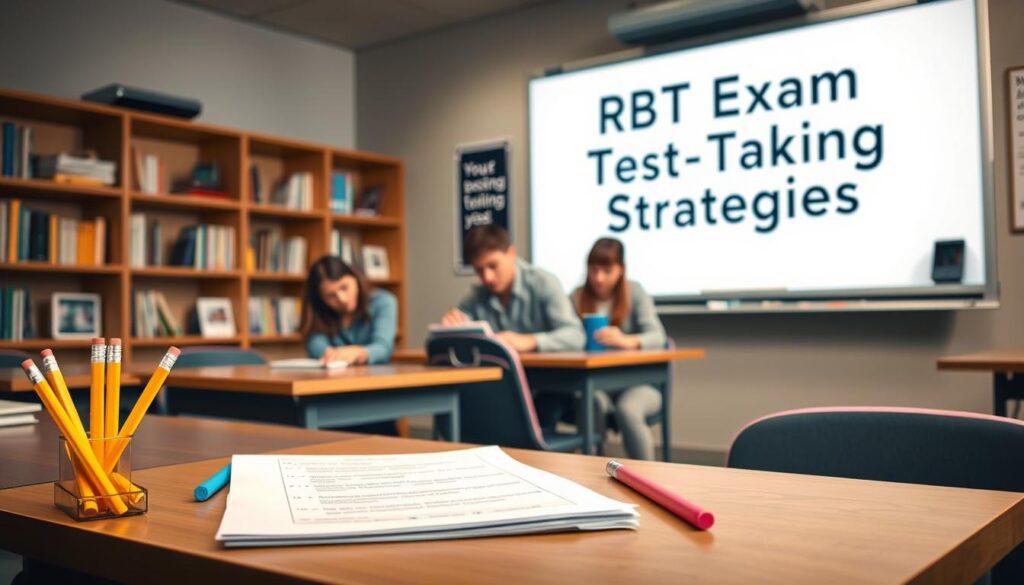
Getting ready for the RBT exam is more than just knowing the material. Learning specific ways to take the test can really boost your success. These tips will help you feel more confident and precise when you take the test.
Understanding the exam’s unique challenges is key. Advice for RBT exam prep includes creating a plan for different question types. First, get to know the exam format and how to manage your time well.
- Practice the process of elimination for multiple-choice questions
- Learn to identify key information quickly
- Develop a consistent approach to scenario-based problems
- Manage your time wisely during the exam
Here are some critical strategies for success:
- Read questions carefully – Look for specific keywords and context clues
- Eliminate obviously incorrect answers – Narrow down your choices systematically
- Use educated guessing – When unsure, apply your fundamental knowledge
| Strategy | Key Action | Benefit |
|---|---|---|
| Time Management | Allocate specific time per section | Complete entire exam |
| Question Analysis | Identify core information quickly | Reduce answer time |
| Stress Control | Practice deep breathing techniques | Maintain focus under pressure |
Remember, the key to passing the RBT exam is building confidence through practice. By using these strategies, you’ll be ready to face the exam’s challenges and show off your skills.
Practical Application Questions: Breaking Them Down
Mastering the RBT exam means knowing how to tackle practical application questions. These questions test your skills in applying behavioral analysis in real-life scenarios. It’s key to understand how to analyze and respond well to these questions.
These questions are not just about memorizing facts. They need you to think critically and use your knowledge to come up with strategies.
Analysis Techniques for Exam Success
Building strong analysis skills is important. Here are some strategies to help:
- Carefully read the entire scenario
- Identify the primary behavioral challenge
- Recognize relevant contextual details
- Eliminate inappropriate response options
Response Development Strategies
When creating your responses, keep these points in mind:
- Show you understand behavioral principles
- Choose interventions that are most appropriate for the scenario
- Explain why you chose that approach
- Highlight your knowledge of ethical considerations
Beating the RBT exam obstacles takes practice and a clear plan. By breaking down scenarios and developing specific response strategies, you can tackle the practical application section with confidence.
Managing Test Anxiety and Stress
Getting ready for RBT certification can make you feel really anxious. It’s important to manage stress to do well on the exam. Getting your mind ready is key to success.
Good stress management can change how you feel during the exam. Those taking the RBT test should use a mix of methods to lower anxiety and feel more confident.
- Practice deep breathing techniques
- Develop a consistent study routine
- Create a positive visualization process
- Establish realistic expectations
To do well on the RBT exam, you need a solid mental plan. Try these relaxation methods:
| Technique | Benefits | Duration |
|---|---|---|
| Meditation | Reduces anxiety, improves focus | 10-15 minutes daily |
| Progressive Muscle Relaxation | Releases physical tension | 15-20 minutes |
| Positive Self-Talk | Builds confidence | Ongoing practice |
Mental preparation is as critical as academic preparation. Make a pre-exam routine with relaxation, sleep, and healthy food. Don’t cram at the last minute, as it raises stress.
Getting certified is not just about knowing stuff. It’s also about being emotionally strong. Use these stress tips to face your RBT exam with confidence and calm.
Mock Exam Importance and Implementation
Passing the RBT exam is not just about reading books. Practice tests are key to getting ready. They show you what you know and what you need to work on.
To use mock exams well, follow these steps:
- Schedule regular practice test sessions
- Simulate real exam conditions
- Time yourself precisely
- Review answers thoroughly
Practice Test Resources
Choosing the right practice tests is important. Look for ones that:
- Match the current RBT exam standards
- Give detailed explanations for each question
- Cover all important topics
- Are available in digital and print formats
Performance Analysis
After taking practice tests, it’s time to analyze your performance. Find your weak spots by looking at the questions you got wrong. Make a plan to study those areas, turning weaknesses into strengths.
Use top ABA training sites, certified RBT exam prep websites, and study materials from professional psychology groups. Keep track of your progress to boost your confidence and get better at taking tests.
Understanding Behavioral Contingencies
Mastering the RBT exam means getting to know behavioral contingencies well. These key ideas are at the heart of applied behavior analysis. They are essential for your study plan.
Behavioral contingencies link certain environmental events to behavior. They have three main parts that help explain and predict human actions:
- Antecedents: Events or situations that happen before a behavior
- Behaviors: The actions or responses we can see
- Consequences: Events that happen after a behavior and affect future actions
To beat the RBT exam, it’s important to grasp how these parts work together. For instance, a child might get praise (consequence) for finishing homework (behavior). This praise comes after a parent’s reminder (antecedent).
When studying these concepts, focus on:
- How antecedents can start specific behaviors
- The effects of positive and negative consequences
- Ways to change behavior
Good RBT candidates see behavioral contingencies as more than just ideas. They are practical tools for understanding and changing behavior. By understanding these interactions, you’ll do well on the exam’s scenario-based questions.
Mastering Measurement and Data Collection
Understanding measurement and data collection is key to passing the RBT exam. Registered Behavior Technicians need to track and analyze data well. This skill is essential for their certification.
Collecting accurate data is vital for behavioral analysis. Those facing RBT exam challenges must learn different recording methods. This shows their expertise.
Key Recording Methods
- Frequency Count: Tracking the number of times a specific behavior occurs
- Duration Recording: Measuring the total time a behavior continues
- Interval Recording: Observing behavior within predefined time segments
- Partial Interval Recording: Documenting behavior occurrence during specific intervals
Data Interpretation Skills
Many RBT exam challenges come from interpreting data. Candidates need strong analytical skills. These skills help turn raw data into useful insights.
| Recording Method | Best Used For | Difficulty Level |
|---|---|---|
| Frequency Count | Discrete, countable behaviors | Low |
| Duration Recording | Continuous behaviors | Medium |
| Interval Recording | Complex behavioral patterns | High |
Success in the RBT exam comes from practicing these methods. Knowing the details of each technique boosts performance in the exam.
Ethics and Professional Conduct Guidelines
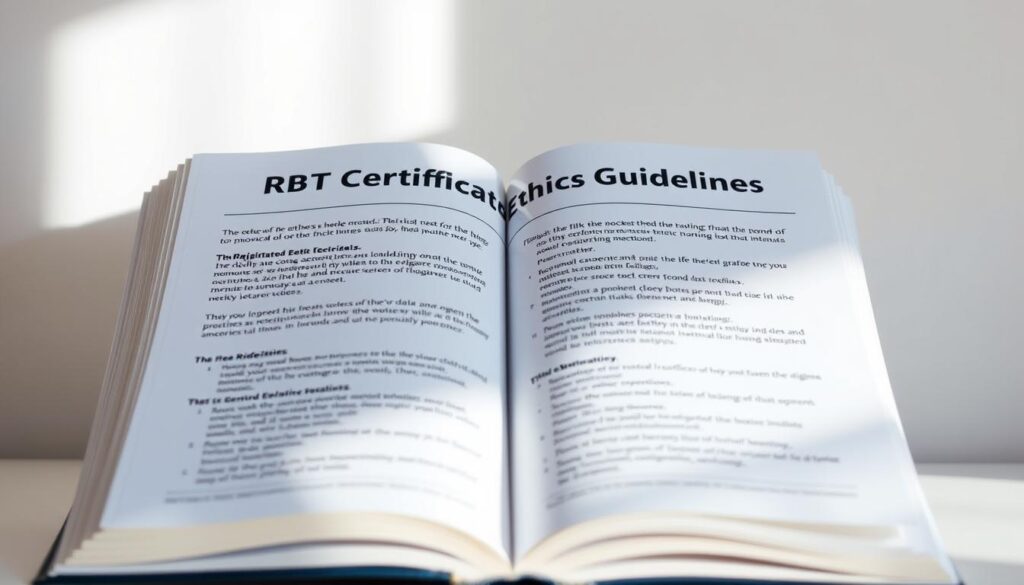
Getting ready for RBT certification means learning about professional ethics. The Behavior Analyst Certification Board (BACB) sets important rules for Registered Behavior Technicians. These rules help keep client care and professional integrity at the highest level.
Important ethical rules for RBTs include:
- Keeping client secrets safe always
- Keeping professional distance
- Ensuring client safety and happiness
- Being clear and truthful in communication
To do well on the RBT exam, you need to understand making ethical choices. RBTs face tough decisions that put client rights and professional duties first. They must handle conflicts of interest, respect client choices, and keep professional relationships strong.
Important ethical things to think about are:
- Confidentiality: Keeping all client info safe
- Consent: Getting the right okay for actions
- Boundaries: Keeping the right distance in work
- Reporting: Telling about possible wrongdoings or safety issues
The BACB has a detailed ethical code for RBTs. The certification exam has questions based on these rules. Candidates who pass show they can use these rules in real life, showing both knowledge and moral sense.
Last-Minute Review Techniques
As your RBT exam gets closer, it’s time to focus. Good last-minute prep can really boost your confidence. Knowing the best ways to prepare for the RBT exam is key.
The days leading up to the exam are key. They’re for making sure you know your stuff and can handle the test. Experts say it’s all about targeted review and getting your mind ready.
Quick Reference Materials
Creating quick study guides is a smart move. Think about making:
- Flashcards with important behavioral terms
- Summary sheets for tough topics
- Mind maps to link related ideas
Memory Enhancement Tips
Improving your memory takes smart strategies. Try these tips:
- Use mnemonic devices for hard concepts
- Test yourself with quizzes
- Link terms with pictures
- Group similar info together
Getting your mind ready is as vital as studying. Use deep breathing and stay positive to fight nerves. Get enough sleep, eat well, and go into the exam feeling ready.
Common Mistakes to Avoid During the Exam
Getting ready for the RBT exam needs careful planning and knowing yourself. Many people face problems that can mess up their score. It’s key to know and get ready for these issues.
To beat RBT exam challenges, first spot the common mistakes. These mistakes can really hurt your score and confidence during the test.
- Misreading Questions: Read each question several times to make sure you get it
- Time Management Challenges: Set a time limit for each part to avoid rushing
- Overthinking Responses: Stick with your first answer and don’t doubt yourself
- Neglecting Key Terminology: Study behavioral analysis words well before the test
Good test-takers plan well to avoid these usual RBT exam problems. Doing mock tests and knowing the question types can boost your confidence and lower test stress.
Key ways to overcome RBT exam obstacles include:
- Using active reading methods
- Creating a detailed study plan
- Using stress management techniques
- Doing full practice tests
Remember, the best way to tackle exam challenges is through good preparation. By spotting possible problems early, you can make a solid plan to pass the RBT certification exam.
Post-Exam Steps and Certification Process
Passing the RBT exam is a big achievement. Knowing what comes next is key to your career in applied behavior analysis.

After you take the exam, you enter a critical phase. The Behavior Analyst Certification Board (BACB) checks your score to see if you qualify for certification.
Score Review and Results Timeline
The review of your score takes 2-4 weeks. You’ll get your results online from the BACB. It’s important to stay patient and ready for what comes next.
- Check email for official BACB communication
- Log into the BACB online portal
- Review detailed score report
- Understand pass/fail criteria
Navigating Certification After Passing
Passing the exam means new career chances. To get your RBT certification, you need to do a few important things.
| Step | Requirement | Timeframe |
|---|---|---|
| Background Check | Submit cleared criminal background screening | Within 30 days |
| Supervisor Verification | Complete supervised fieldwork documentation | Before final certification |
| Registration | Pay certification fees | Immediately after passing |
Pro tip: Keep all your documents ready and stay active in the certification process for a smooth journey.
If you don’t pass the exam, don’t worry. Many people need to try a few times. Look at your score report, find out what you need to work on, and make a plan for your next try.
Conclusion
Getting ready for the Registered Behavior Technician (RBT) exam needs careful planning and a deep grasp of behavioral techniques. Our guide has given you key insights on common RBT exam challenges. It has also given you practical tips to tackle the certification process with confidence.
Becoming an RBT is more than just passing a test. It’s a promise to help people with behavioral needs with care and skill. By following the tips for passing the RBT exam in this guide, you’ll gain the essential skills and knowledge for this fulfilling career.
Preparation is not just about memorizing facts. It’s about understanding behavioral principles, ethics, and how to apply them. Every study session moves you closer to your career goals. It turns challenges into chances for growth and learning.
Your hard work in professional growth will show in your success as an RBT. Stay committed, be patient with yourself, and go into the exam with confidence. The behavioral health field needs dedicated professionals like you who want to make a real difference in people’s lives.
